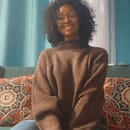I am an embarrassingly huge fangirl. I’m rarely someone who just watches a show or reads a book; I read up on all the fan theories, psychoanalyze characters, read fanfiction, and watch fan edits. And I’ve always really loved the fantasy genre (and when I say fantasy genre, I would like to encompass sci-fi and supernatural works as well). However, there has always been this sort of cognitive dissonance between my feminist identity and my fantasy-fangirl identity.
I didn’t come to understand where this disharmony came from until I finally watched the ‘80s sci-fi film Blade Runner. Blade Runner is a very complex film, following a man named Deckard who is a blade runner. Blade runners hunt rogue replicants, which are basically synthetic human adults who only live for four years and spend these four years doing labor for a major corporation. In this movie, Deckard hunts down a group of rogue replicants who have become aware of their different reality and seek revenge against the corporation.
Now, there are a lot of problems for me with this movie, just looking at the general plot—I was one of the few people that were actually rooting for the replicants—but something that made me very uncomfortable was the depiction of the few female characters in the story. All the women were horribly sexualized and dehumanized, and they died in perverse ways. A female fugitive replicant who appears several times throughout the film never speaks and is just seen killing people, always nearly naked and she is shot several times very viciously in a nude leotard by the male protagonist. There is a scene where a woman is gunned down while running in a see-through coat in her underwear and thigh-high heel boots.
The only woman that avoided these depictions of sex and violence was Rachel, a replicant that Deckard fell in love with, who never actually realizes she’s a replicant because no one—including Deckard, who is aware of her status and that she will only live for four years—tells her. She seems like a completely helpless and naïve damsel in distress.
When I talked to male sci-fi nerds about this, it seemed as if they had never noticed it before and were either very uncomfortable when I pointed it out or brushed me off, claiming I was just looking for things to complain about. This is when I came to realize the root of my unease with fantasy was the excessive sexual violence and general dehumanization of women that often seems like it’s male writers’ way of seeking revenge on beautiful girls who rejected them in the past. While this may sound like a harsh generalization, when you examine shows like Game of Thrones, where two of the main female characters—and many more in the books—are the victims of graphic sexual abuse and rape and sexual humiliation for women is strangely common, or the Netflix series Altered Carbon, which I couldn’t even watch the recently-released second season of because the first had been so full of sexual violence, it’s hard to say that I’m wrong.
To make matters worse, male fans either get very defensive or very uncomfortable when these things are called out, making me realize how common this kind of stuff is in the genre. This isn’t to say that men who enjoy fantasy think depictions of sexual assault are okay, but these depictions have become normalized to the point that male fans either think you’re being nitpicky because they’re so used to seeing this type of violence in fantasy works or they don’t even notice how excessive it is in the first place until it’s directly pointed out.
Fantasy writers are appealing to a male audience that will either not notice or care about these things as much as women might, thinking that women just aren’t as interested in the genre when in reality they drive women away from the genre with these horrifying depictions of female characters. This isn’t only disappointing to me but it also seems stupid; realistically, if you’re trying to make money off of your work, it seems like you would try to make your work appeal to as wide a demographic as possible and since there are certainly women who love fantasy the way I do, why not do what you can to draw us in?
Take for instance, the fairly new Netflix TV series, The Witcher. While I have not read the books or played the video game, this has become one of my favorite fantasy shows largely because it is the only male-written fantasy works I’ve ever seen or read that isn’t chock-full of sexual violence and doesn’t center around the male gaze; the women in the show are well-fleshed out and interesting and allowed to exist outside of the male protagonist.
This has benefited the show greatly, as it has been very popular with men and women alike and there are many articles about the amazing female characters. It’s one of the few fantasy shows that I’ve been able to actually discuss with my female friends because it’s one of the few fantasy shows that seems to actively appeal to women without feeling forced. And I think that we need more of that in the genre.
Women don’t want to see stories riddled with sexual violence that goes unquestioned or unnecessary close-ups on women’s naked bodies, with only the overly tough and masculine women escaping these depictions. We want to see women that are allowed to exist outside of that, women who are allowed to be realistic even in a fantasy world.


